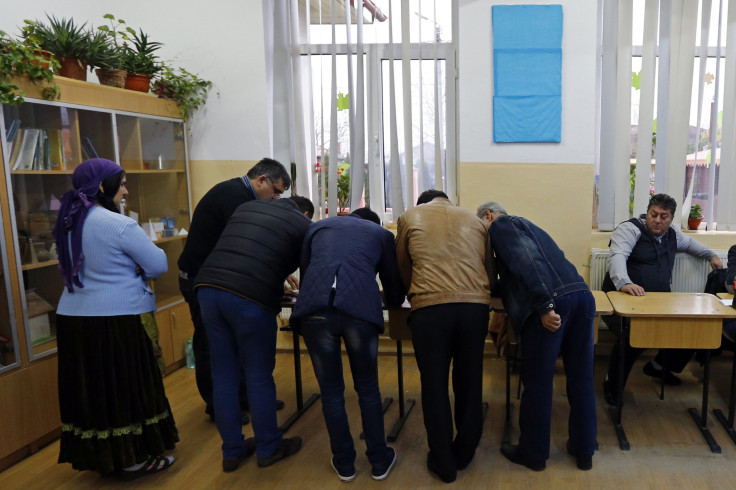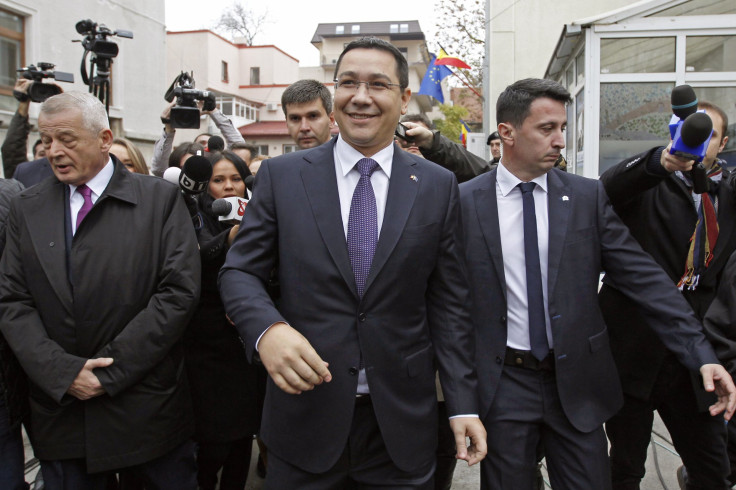Romania's Presidential Race Too Close To Call

BUCHAREST (Reuters) - Romania's presidential race was neck-and-neck on Sunday, with exit polls showing center-right candidate Klaus Iohannis staging a surprising comeback against frontrunner Prime Minister Victor Ponta, which could leave the result in the hands of voters abroad.
Backed by a well-oiled party machine, Ponta had led opinion polls throughout the campaign and comfortably beat Iohannis, an ethnic German, in the first round election on Nov 2. However, exit polls on Sunday showed a mixed picture, with two showing just over 50 percent for Ponta and two others showing the same for Iohannis, and one split exactly down the middle.

"We're seeing a spectacular comeback by Iohannis, who now has a competitive advantage over Ponta in a tight vote," said political commentator Cristian Patrasconiu.
"It's still very hard to predict a winner, but it's clear that the final outcome will depend on votes from the diaspora, who showed up at polling stations in larger numbers than in the first round."
The former Communist state of 20 million is emerging from painful budget cuts imposed during the global slowdown. Growth rebounded to more than 3 percent in the third quarter of 2014, but corruption and tax evasion are rife, and progress to implement reforms and overhaul a bloated state sector is mixed.
A former prosecutor and amateur rally driver, the 42-year-old Ponta had courted voters with tax cuts and promises of more pension increases, shrugging off several scandals that dogged the final weeks of his campaign.
A Ponta presidency would tighten his leftist Social Democrat party's grip on power. Prime minister since 2012, Ponta often feuded with his rival, outgoing President Traian Basescu, which stymied policymaking and caused a constitutional crisis.
Without the check on power hitherto provided by Basescu, Ponta's rise has raised concerns he might tighten political control over the judiciary, prosecutors and media, in a country whose justice system remains under special EU supervision.
But Iohannis as president would, like Basescu, face a hostile Social Democrat majority in parliament that could cause more policy wrangling.

Overseas voters played a key role in swinging the vote at the last election in 2009, and could do so again. Romania's large and growing diaspora is widely seen as anti-Ponta, and many voiced their anger when long queues and bureaucratic hurdles prevented them from voting in the first round.
The uproar triggered the foreign minister's resignation, sparked protests in cities across Romania and may have helped galvanize the anti-Ponta vote. On Sunday night, thousands marched on the streets in Bucharest carrying banners that said "red plague", "down with the government", "solidarity with the diaspora" and chanting the national anthem.
TV footage and pictures showed long queues outside voting stations again in cities across Europe, including London and Paris. Waiting since the early hours of Sunday morning, voters in Munich flashed toothbrushes to cameras, to show how long they were prepared to wait to exercise their democratic right.
The office of president was created under Communist dictator Nicolae Ceausescu in 1974 and is a powerful position, with the holder able to appoint the prime minister, judges and prosecutors -- and also stall government policy proposals.
"Victor Ponta has made a few major strategic mistakes," said Sergiu Miscoiu, an analyst with the CESPRI political think tank.
"A major mistake was ostracizing the diaspora. The main result of that was not necessarily the diaspora vote, but the solidarity with it in Romania."
Iohannis is a former high-school physics teacher credited with transforming the medieval Transylvanian town of Sibiu into a tourist hub during his time as mayor. One of his two main backers, the center-right Democratic Liberal Party, was toppled by anti-austerity protests that paved the way for Ponta to become premier.
© Copyright Thomson Reuters 2024. All rights reserved.





















